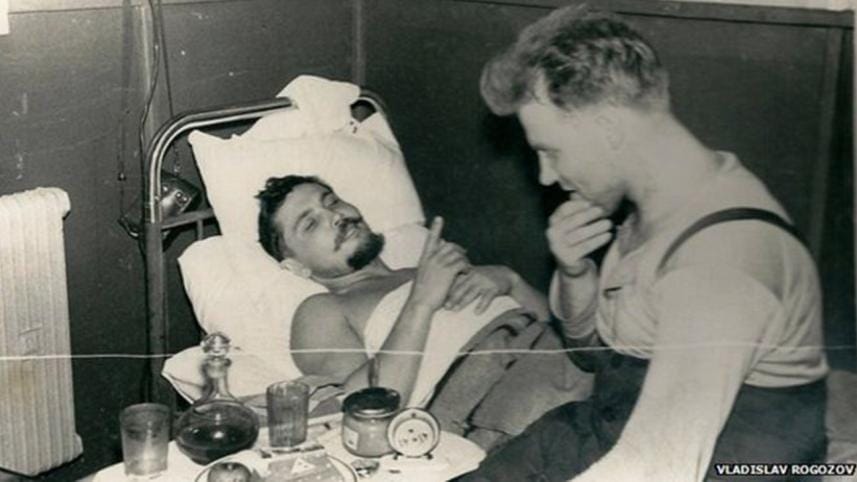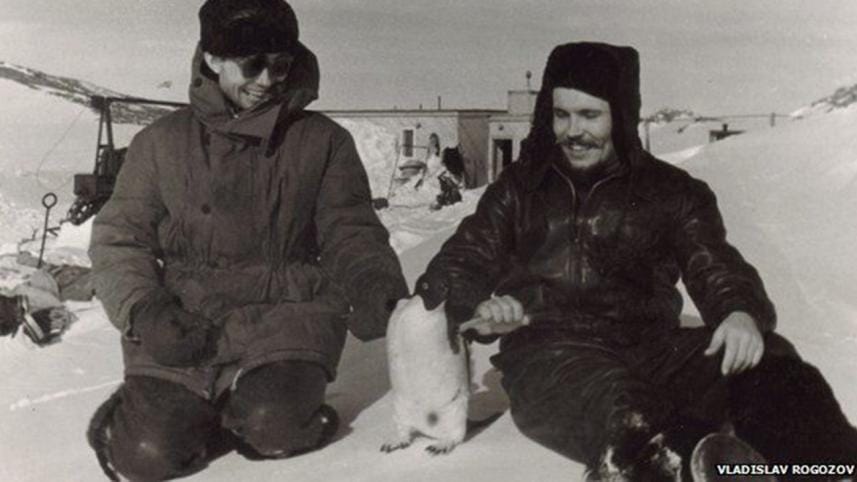The man who cut out his own appendix

During an expedition to the Antarctic, Russian surgeon Leonid Rogozov became seriously ill. He needed an operation - and as the only doctor on the team, he realised he would have to do it himself.
As the polar winter rolled in, 27-year-old Leonid Rogozov started to feel tired, weak and nauseous. Later, a strong pain developed down the right side of his abdomen.
"Being a surgeon, he had no difficulty in diagnosing acute appendicitis," says his son, Vladislav. "It was a condition he'd operated on many times, and in the civilised world it's a routine operation. But unfortunately he didn't find himself in the civilised world - instead he was in the middle of a polar wasteland."
Rogozov was part of the sixth Soviet Antarctic expedition - a team of 12 had been sent to build a new base at the Schirmacher Oasis.
The Novolazarevskaya Station was up and running by the middle of February 1961, and with their mission complete the group settled down to see out the hostile winter months.
But by the end of April, Rogozov's life was in danger and he had no hope of outside help. The journey from Russia to the Antarctic had taken 36 days by sea, and the ship wouldn't be back for another year. Flying was impossible because of the snow and blizzards.

"He was confronted with a very difficult situation of life and death," says Vladislav. "He could wait for no help, or make an attempt to operate on himself."
It was not an easy choice. Rogozov knew his appendix could burst and if that happened, it would almost certainly kill him - and while he considered his options, his symptoms got worse.
"He had to open his own abdomen to take his intestines out," says Vladislav. "He didn't know if that was humanly possible."
In addition, this was the Cold War, with East and West competing in nuclear, space and polar races - the weight of which rested on both nations and individuals.
The commander in charge of the Novolazarevskaya base had to get Moscow's blessing for the operation to go ahead. "If my father was to fail and die it would definitely put a hard hat of negative publicity on the Soviet Antarctic programme," says Vladislav.
Rogozov made his decision - he would perform an auto-appendectomy rather than die not doing anything.
"I did not sleep at all last night. It hurts like the devil! A snow storm whipping through my soul, wailing like 100 jackals," he wrote in his diary.
"Still no obvious symptoms that perforation is imminent, but an oppressive feeling of foreboding hangs over me… This is it… I have to think through the only possible way out - to operate on myself… It's almost impossible… but I can't just fold my arms and give up."
Rogozov worked out a detailed plan for how the operation would unfold and assigned his colleagues specific roles and tasks.
He nominated two main assistants to hand him instruments, position the lamp, and hold a mirror - he planned to use the reflection to see what he was doing. The station director was also in the room, in case one of the others became faint.
"He was so systematic he even instructed them what to do if he was losing consciousness - how to inject him with adrenalin and perform artificial ventilation," says Vladislav. "I don't think his preparation could have been better."
A general anaesthetic was out of the question. He was able to administer a local anaesthetic to his abdominal wall but once he had cut through, removing the appendix would have to be done without further pain relief, in order to keep his head as clear as possible.
"My poor assistants! At the last minute I looked over at them. They stood there in their surgical whites, whiter than white themselves," Rogozov wrote later. "I was scared too. But when I picked up the needle with the novocaine and gave myself the first injection, somehow I automatically switched into operating mode, and from that point on I didn't notice anything else."
Rogozov had intended to use a mirror to help him operate but he found its inverted view too much of a hindrance so he ended up working by touch, without gloves.
As he reached the final and hardest part of the operation, he almost lost consciousness. He began to fear he would fail at the final hurdle.
"The bleeding is quite heavy, but I take my time... Opening the peritoneum, I injured the blind gut and had to sew it up," Rogozov wrote. "I grow weaker and weaker, my head starts to spin. Every four to five minutes I rest for 20 - 25 seconds.
"Finally here it is, the cursed appendage! With horror I notice the dark stain at its base. That means just a day longer and it would have burst… My heart seized up and noticeably slowed, my hands felt like rubber. Well, I thought, it's going to end badly and all that was left was removing the appendix."
But he didn't fail. After nearly two hours he had completed the operation, down to the final stitch.
Then, before allowing himself to rest, he instructed his assistants how to wash the surgical instruments and only when the room was clean and tidy did Rogozov take some antibiotics and sleeping tablets.
It was a staggering achievement. "Most importantly he was relieved because he had another chance to live," says Vladislav.
Rogozov returned to his normal duties just two weeks later.
"I was a medical student in the early 60s and remember being taught what to do if we found ourselves in the Antarctic with appendicitis. We were told to sit upright with our knees pulled up to our chests. Then if the appendix did burst, in this position we had the best chance of pus draining into the bottom of the pelvis and becoming walled off in an abscess, rather than infecting the peritoneum - the membrane that covers the inside of the abdomen. Peritonitis can kill you. We weren't advised to reach for the scalpel."
Dr Duncan Gee
There was to be one more twist to this extraordinary story. A spell of exceptionally bad weather and thick sea ice meant the ship due to pick them up in April 1962 couldn't get close enough and the team thought they would have to spend another year in Antarctica.
As a surgeon, Rogozov was concerned about losing touch with the medical world, and on a personal level he was trapped in the place where he had the most terrible experience of his life.
In his diary he wrote: "More and more often waves of dull home sickness and hatred of this cursed Antarctica wash over me. How odd it seems that I ever agreed to go on this expedition. All the exoticism of Antarctica was exhausted within a month and in return I'm losing two years of my life. My clinic, which I love more than any worldly pleasure, seems as far from here as Mars."
To the relief of the whole team they were eventually airlifted out, albeit slightly later than planned.
"They had to be evacuated by single-engine planes," says Vladislav. "Very dramatically one of the planes almost dropped into the sea."
Rogozov returned home a national hero. His incredible survival story was a powerful tool for the Soviet propaganda machine. Just 18 days before performing his operation, fellow Russian, Yuri Gagarin, had become the first man in space, and comparisons were drawn between the two men.
"It was a strong parallel because they were both of the same age, 27, they both came from working class backgrounds, and they both achieved something that had not been achieved in human history before. They were prototypes of the ideal national superhero," says Vladislav.
Rogozov was awarded the Order of the Red Banner of Labour which honoured great deeds and services to the Soviet state and society. His bravery was held up as a symbol to the rest of the world: "Look at this generation of young people that our system has produced - young, handsome, smiling, nice fellows," says Vladislav. "But at the same time made of steel and iron determination."
Rogozov, though, shunned the publicity. The day after he returned home he went back to his hospital and resumed his career.
Appendectomies are now compulsory for Antarctic explorers from several countries such as Australia. And some in the medical profession have suggested the procedure should be given to any future astronauts leaving the Earth to form a colony on Mars or the Moon.
Looking back at his father's legacy, Vladislav believes it is one of inspiration. "If you find yourself in a seemingly desperate situation when all the odds are against you. Even if you are in the middle of the most hostile environment, do not give up. Believe in yourself and fight, fight for life."



 For all latest news, follow The Daily Star's Google News channel.
For all latest news, follow The Daily Star's Google News channel.
Comments